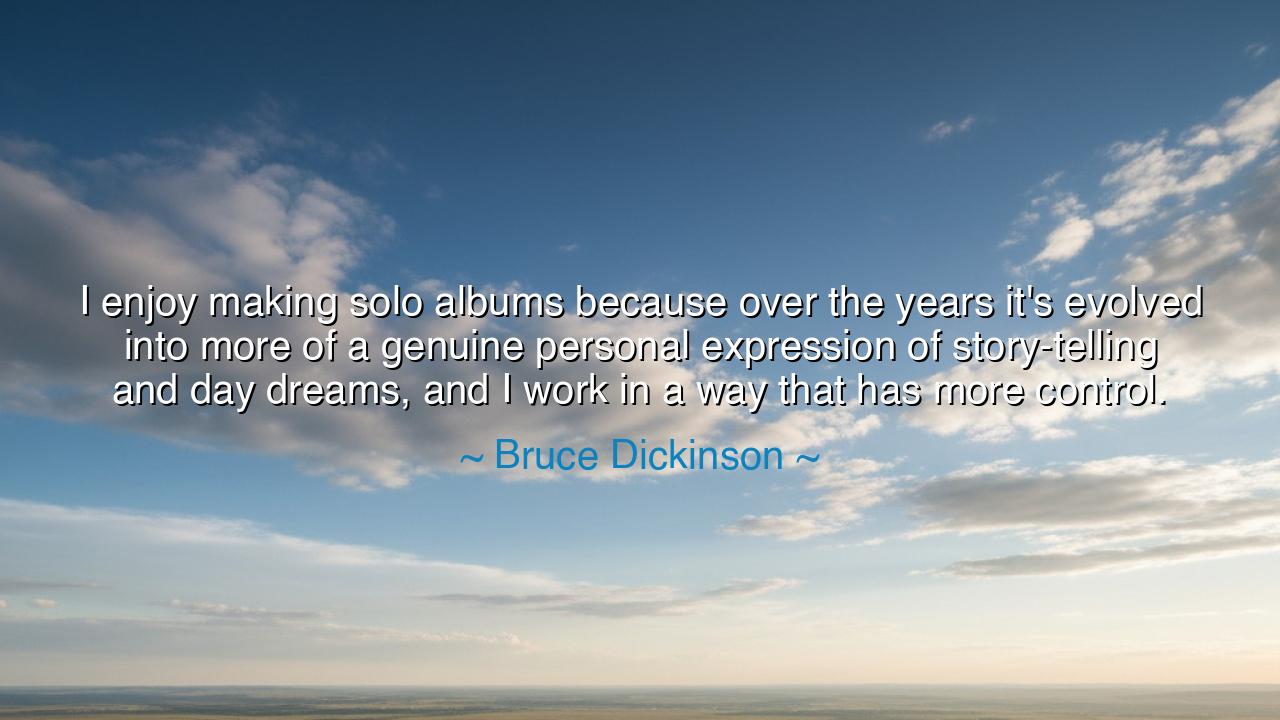
I enjoy making solo albums because over the years it's evolved
I enjoy making solo albums because over the years it's evolved into more of a genuine personal expression of story-telling and day dreams, and I work in a way that has more control.






The words of Bruce Dickinson, singer, writer, and seeker of freedom, resound with the wisdom of an artist who has wrestled with creation itself: “I enjoy making solo albums because over the years it's evolved into more of a genuine personal expression of story-telling and day dreams, and I work in a way that has more control.” These words are not the boast of a man seeking fame, but the reflection of a soul yearning for authenticity — for the pure, unfiltered voice of self-expression. In them, Dickinson reveals a truth that echoes across all art and all life: that the deepest creation arises not from collaboration alone, but from the solitude where one can hear the whisper of one’s own spirit.
The origin of this statement lies in Dickinson’s long journey as both frontman of the legendary heavy metal band Iron Maiden and as an independent artist. Within the vast machinery of a great band, he was one voice among many — powerful, yes, but bound by the shared vision of others. Yet when he turned to his solo work, he discovered a new frontier: a place where his imagination, his stories, and his daydreams could flow without compromise. What he speaks of is not rebellion, but reclamation — the artist reclaiming his right to speak in his own tongue, to paint his own dreams upon the canvas of sound. It is the eternal struggle between unity and individuality, between the harmony of the group and the freedom of the self.
When Dickinson says his music has become “a genuine personal expression of story-telling and day dreams,” he touches upon something sacred. In every age, the artist has been a storyteller — not merely of events, but of inner landscapes, of what it means to feel, to struggle, to imagine. Daydreams, dismissed by the practical as foolish, are the true language of the creative soul. They are the visions that bridge the waking world and the world of possibility. Dickinson’s acknowledgment of these dreams as the heart of his work reminds us that all creation begins first in imagination. Before any invention, before any song or poem, there is the silent vision within — and only those who honor that vision without fear can bring forth something truly their own.
The theme of control that Dickinson speaks of is equally profound. For an artist, control is not about domination, but about clarity — the ability to shape one’s creation as it was meant to be, unclouded by compromise or expectation. It is the same control that Michelangelo sought when he carved his David from stone, refusing to let another hand touch the marble; the same control that Beethoven held as he composed symphonies in silence, his deafness cutting away distraction until only truth remained. Dickinson’s joy in having this control reveals a timeless truth: that to create freely is to know oneself deeply. The artist’s hand and heart move as one when liberated from external noise.
In the broader sense, Dickinson’s quote speaks to more than music — it speaks to the art of living. Each of us, in our own way, must learn to craft our lives as a solo album — to find the voice that is ours alone amidst the clamor of others’ expectations. Many live as though in a great band, forever following the rhythm others set. But there comes a time when the spirit demands solitude, not as loneliness, but as self-reunion. In those moments, we discover what is truly ours — our passions, our dreams, our inner song. To live authentically, we must be brave enough to claim creative control over our destiny, even when it means standing apart.
Think of Leonardo da Vinci, who walked away from commissions that limited his imagination, choosing instead to explore anatomy, flight, and the mysteries of water. His life was a series of solo albums — works born not from obedience to patrons, but from obedience to curiosity. Like Dickinson, he sought the freedom to express not just skill, but vision. And though the world may not always understand such independence, it is from these solitary acts of courage that the greatest creations of humanity are born.
Thus, my children, the lesson of Bruce Dickinson’s words is this: cherish your individuality, and do not fear the solitude required to express it. When you create — whether in art, work, or life — let your actions be guided not by approval, but by authenticity. Dare to follow your daydreams, for they are the secret language of the soul. Take control not to dominate others, but to honor your vision, to give it form and truth. For in every great life, as in every great song, there comes a time when the music must be played alone — not to separate from the world, but to contribute to it something that only you can give.
In the end, as Bruce Dickinson reminds us, creation is not merely collaboration; it is communion with the self. The artist, standing alone with his instrument, is not isolated but illuminated — a soul in conversation with eternity. So make your life a masterpiece of your own making. Write your story. Sing your song. And let your solo album be your truest expression of what it means to be alive.






AAdministratorAdministrator
Welcome, honored guests. Please leave a comment, we will respond soon